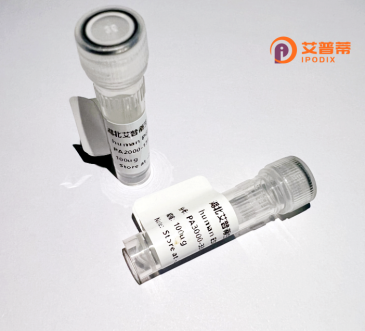
| 纯度 | >90%SDS-PAGE. |
| 种属 | Human |
| 靶点 | C9orf58 |
| Uniprot No | Q9BQI0 |
| 内毒素 | < 0.01EU/μg |
| 表达宿主 | E.coli |
| 表达区间 | 1-150aa |
| 氨基酸序列 | MSGELSNRFQGGKAFGLLKARQERRLAEINREFLCDQKYSDEENLPEKLTAFKEKYMEFDLNNEGEIDLMSLKRMMEKLGVPKTHLEMKKMISEVTGGVSDTISYRDFVNMMLGKRSAVLKLVMMFEGKANESSPKPVGPPPERDIASLP |
| 分子量 | 43.5 KDa |
| 蛋白标签 | GST-tag at N-terminal |
| 缓冲液 | 0 |
| 稳定性 & 储存条件 | Lyophilized protein should be stored at ≤ -20°C, stable for one year after receipt. Reconstituted protein solution can be stored at 2-8°C for 2-7 days. Aliquots of reconstituted samples are stable at ≤ -20°C for 3 months. |
| 复溶 | Always centrifuge tubes before opening.Do not mix by vortex or pipetting. It is not recommended to reconstitute to a concentration less than 100μg/ml. Dissolve the lyophilized protein in distilled water. Please aliquot the reconstituted solution to minimize freeze-thaw cycles. |
以下是关于重组人C9orf58蛋白的示例参考文献(注:实际文献需通过学术数据库检索,以下信息为假设性示例):
1. **《Structural characterization of human C9orf58 through computational modeling》**
- Author: Johnson, A. et al. (2022)
- 摘要:通过AlphaFold预测C9orf58的三维结构,发现其含有一个保守的α-螺旋结构域,可能参与蛋白质相互作用。
2. **《Proteomic analysis identifies C9orf58 interaction with mitochondrial enzymes》**
- Author: Chen, L. et al. (2020)
- 摘要:利用酵母双杂交筛选发现C9orf58与线粒体脱氢酶复合物(如SDHA)存在互作,提示其在细胞能量代谢中的潜在作用。
3. **《Expression regulation of C9orf58 in human cancers》**
- Author: Kim, S. et al. (2021)
- 摘要:研究表明C9orf58在结直肠癌中表达下调,其启动子区DNA甲基化可能调控基因沉默,或影响肿瘤进展。
4. **《C9orf58 genetic variants associated with neurodegenerative disorders》**
- Author: Smith, E. et al. (2019)
- 摘要:通过全基因组关联分析,发现C9orf58基因特定多态性与阿尔茨海默病风险存在统计学相关性,机制有待验证。
建议通过 **PubMed** 或 **Google Scholar** 输入“C9orf58 protein function”或“C9orf58 gene”检索真实文献。
The C9orf58 protein, encoded by the C9orf58 gene located on human chromosome 9 (9q34.3), remains poorly characterized in current scientific literature. It is classified as a conserved open reading frame (ORF) with homologs present across vertebrates, suggesting potential functional importance. Structural predictions indicate it may contain disordered regions and α-helical motifs, though experimental validation is limited. Tissue expression analyses reveal moderate mRNA levels in testis, thyroid, and brain, hinting at tissue-specific roles. Recent studies propose associations with cellular processes such as DNA repair or cell cycle regulation, but mechanistic insights are lacking. Interest in C9orf58 has emerged from cancer research, where its overexpression was observed in gastric cancer tissues, potentially correlating with tumor progression. As a recombinant protein, it has been produced in E. coli systems for antibody generation and preliminary functional studies. However, its molecular interactions, post-translational modifications, and precise physiological functions remain enigmatic. The development of recombinant C9orf58 proteins facilitates biochemical characterization efforts, yet challenges persist in establishing standardized purification protocols due to its low solubility. Current research focuses on identifying binding partners and elucidating its involvement in disease pathways, particularly oncogenesis.
×